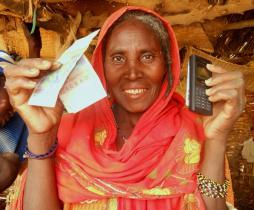cash transfer
Posted by MarkWeingarten on Mar 02, 2011
Cutting Costs, Boosting Quality and Collecting Data Real-Time: Lessons from a Cell Phone-Based Beneficiary Survey to Strengthen data sheet 1349 Views
Author:
Schuster, Christian and Perez Brit, Carlos
Abstract:
A 2010 Country Governance and Anti-Corruption (CGAC)-funded pilot in Guatemala employed entry-level mobile phones in conjunction with EpiSurveyor, a free, web-based software for data collection, to drastically reduce cost, facilitate accuracy and accelerate implementation of a nationally-representative beneficiary survey of Guatemala‘s conditional cash transfer program.
As such, it illustrates the potential of mobile phone-based data collection to strengthen program monitoring, evaluation and implementation, in particular in remote and marginalized areas highly populated by indigenous peoples.
Posted by KatrinVerclas on Jun 09, 2010
This guest post was submitted by Amanda McClelland, Emergency Nutrition and Food Security Manager, Concern Worldwide, Niger.
I arrived in Niger three months ago to help the Concern Worldwide country team scale up and roll out an emergency program to respond to the emerging food crisis. It’s hard to say when exactly this shifted from an “impending crisis” to a real humanitarian emergency, but we are there now. And we are putting every bit of the planning this team has done since December to the test. The official Food Security survey of April 2010 states that there are 7.1 million people facing hunger: 3.3 million of those are considered to be facing extremely food shortages and unable to feed their families’ without help. Concern’s program is in Tahoua, the second worst affected part of the country.
Every day, we are working at maximum capacity on initiatives to prevent rates of malnutrition from reaching emergency thresholds. We are distributing seed packs and fertilizer to help families plant crops in time for the next harvest; providing nutrition support to children under five, pregnant women and mothers; and are launching an innovative use of mobile phone technology (and manual transfers) to distribute emergency cash to the most vulnerable women. We have high hopes for this program—and we are starting to see its great potential. (Note of the editor: Concern conducted a similar mobile cash program in Kenya in 2008 that we wrote up on MobileActive.org here. Concern also published an extensive evaluation of the Kenya programme (PDF)
What we are doing sounds easy when I write it, but delivering aid in Niger is anything but easy.
| The Secret Weapons in Niger’s Fight Against Hunger: Photo IDs & Mobile Phones. A Guest Post from Concern Worldwide data sheet 5207 Views |
| Countries: |
Niger
|
Posted by AnneryanHeatwole on Feb 23, 2010
Cash Transfers through Mobile Phones: An Innovative Emergency Response in Kenya data sheet 3581 Views
Author:
Dipankar Datta, Anne Ejakait, Kim Scriven
Abstract:
Kenya was one of the first countries to use mobile phones for cash transfers; through a service called M‐PESA, developed by Safaricom Limited. Concern Worldwide has pioneered the use of M‐PESA for emergency cash transfers in Kenya. This paper highlights Concern’s experience, which shows that despite initial software and logistical challenges, mobile phone technology offers a unique and empowering approach to efficiently deliver assistance to the most vulnerable people living in insecure and remote rural areas.
Experience also shows that cash transfers are a better option than food distributions in areas where adequate supplies of food are locally available. In addition, the partnership between Concern and Safaricom demonstrates that the private sector has significant and unique abilities to enhance the effectiveness of emergency response, and more importantly they can do so while maintaining their core business principles. The case study also demonstrates how technology can empower poor, marginalised and vulnerable people.

